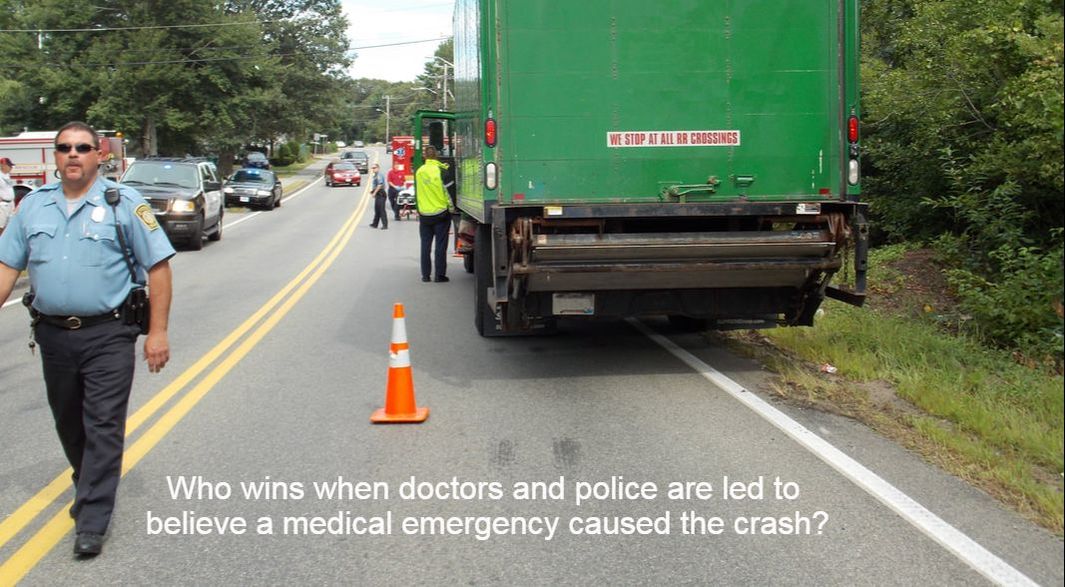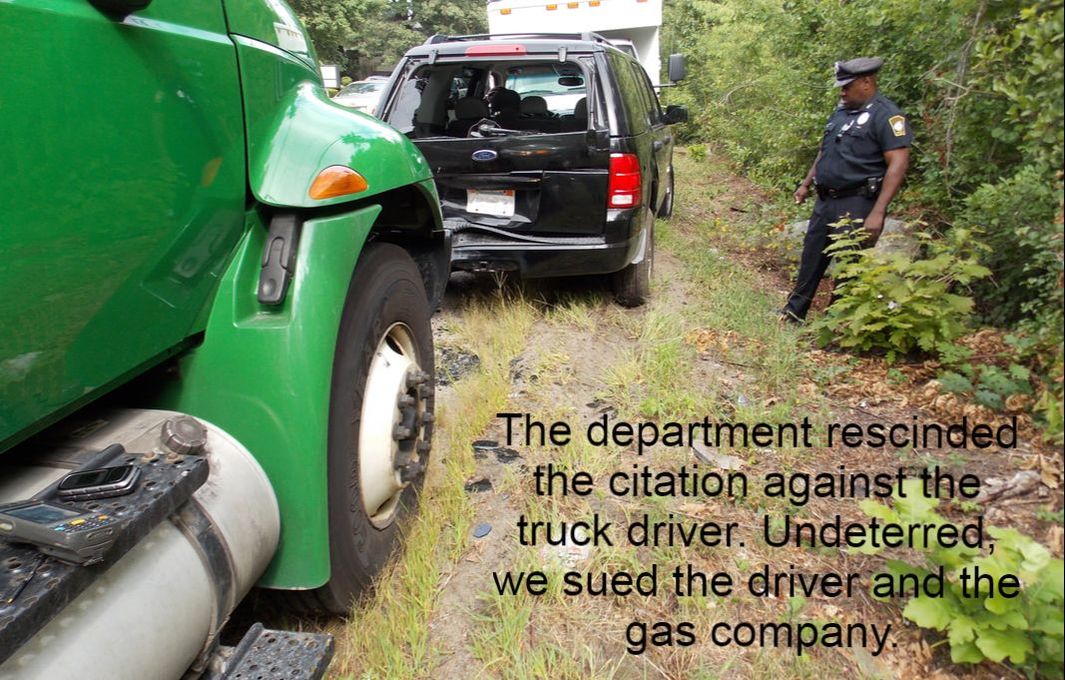
During the morning of August 23, 2013, a gas delivery driver for Acme Propane was driving a box truck loaded with propane cylinders. It was a dry, clear day. He drove past orange safety signs alerting him that he was approaching a work zone then drove over two orange cones. He drove off the road and smashed straight into the back of a parked vehicle within the work zone, totaling it. Initially, the police cited him for his negligence. Sitting inside that parked vehicle was Officer Rogers. The officer’s non-belted body was whipped backward and forward, causing nearly a year’s worth of disabling back pain requiring injections and intensive therapy to return him to duty. During that time, a defense was mounted by the truck driver and his employer, a national company, that wrenched layers of complication onto what first appeared to be a cut and dry case.
After the crash, the truck driver was transported by ambulance to the hospital. In the ambulance and at the hospital, he reported he had an unexpected coughing fit, then passed out before the crash. If this was true, it would be a complete defense to any case against him and his employer under the sudden incapacitation doctrine, and Officer Rogers could not recover a penny. The hospital doctors diagnosed the truck driver with pneumonia causing vasovagal syncope, which confirms he coughed so hard he passed out. The truck driver’s doctor corroborated this diagnosis when he followed up. The medical report of these diagnoses was sent to the police department which had cited the truck driver. The department rescinded the citation. Undeterred, we sued the truck driver and the gas company.
After the crash, the truck driver was transported by ambulance to the hospital. In the ambulance and at the hospital, he reported he had an unexpected coughing fit, then passed out before the crash. If this was true, it would be a complete defense to any case against him and his employer under the sudden incapacitation doctrine, and Officer Rogers could not recover a penny. The hospital doctors diagnosed the truck driver with pneumonia causing vasovagal syncope, which confirms he coughed so hard he passed out. The truck driver’s doctor corroborated this diagnosis when he followed up. The medical report of these diagnoses was sent to the police department which had cited the truck driver. The department rescinded the citation. Undeterred, we sued the truck driver and the gas company.

Discovery focused on proving the lie. Critical to this case, as with so many, were photographs taken at the scene by responding officers capturing small skid marks left just behind the rear tires of the gas truck. This raised the specter that the driver had attempted to stop just prior to striking Officer Roger’s car rather than being unconscious during the crash. However, the possibility remained that the marks were made by the immediate deceleration of the truck upon impact with a stopped car. Next, we confirmed with Officer Rogers and an auxiliary officer who was first on scene that the truck driver made no mention of losing consciousness prior to the crash. Further, the truck driver himself, after traversing a couple hundred feet while unconscious in a truck filled with gas cylinders, made no inquiry as to any harm he had done and expressed no concern.
Finally, the geometry of the roadway proved crucial. Through several data points, we discredited the truck driver’s account of losing consciousness prior to impact. Since there was a left-hand bend in the road prior to the crash scene, and the truck made a flush impact with the back of the parked car, it was clear the gas truck navigated that left turn and then straightened out before impact. Had he passed out at some point during the turn, as he initially claimed, he would have ended up in the woods instead. This point proved sufficient to convince the parties involved that our case would ultimately prevail, regardless of what the truck driver claimed, and what the doctors believed.
After lengthy litigation proceedings this case resolved at mediation for $300,000.00. This completely compensated Officer Rogers for every penny of overtime and detail pay he missed while he was out of work and more. It was a privilege working with Officer Rogers to reach a just result for his case.
- Zachary M. Ballin, Esq.
Finally, the geometry of the roadway proved crucial. Through several data points, we discredited the truck driver’s account of losing consciousness prior to impact. Since there was a left-hand bend in the road prior to the crash scene, and the truck made a flush impact with the back of the parked car, it was clear the gas truck navigated that left turn and then straightened out before impact. Had he passed out at some point during the turn, as he initially claimed, he would have ended up in the woods instead. This point proved sufficient to convince the parties involved that our case would ultimately prevail, regardless of what the truck driver claimed, and what the doctors believed.
After lengthy litigation proceedings this case resolved at mediation for $300,000.00. This completely compensated Officer Rogers for every penny of overtime and detail pay he missed while he was out of work and more. It was a privilege working with Officer Rogers to reach a just result for his case.
- Zachary M. Ballin, Esq.

 RSS Feed
RSS Feed
